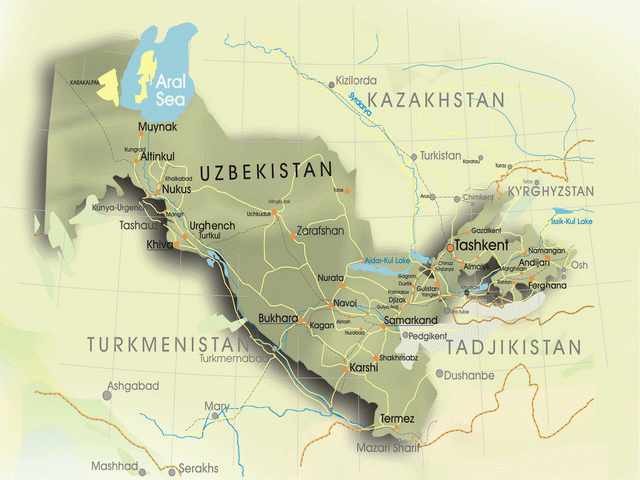
Since the announcement of withdrawal of U.S. troops from Afghanistan there have been many disputes about US policy in Central Asia after 2014. These disputes still continue. I don’t know what decisions the United States will make, but nevertheless I think it is very important to continue an active foreign policy in the region. There are several very important reasons.
First, the United States should prove in practice that promoting democracy and human rights are among the main directions of its foreign policy. In the period of the Soviet Union, Central Asian nations were disconnected from the world and knew America only from one side: as an enemy of the Soviet Union. After independence thanks to international organizations the U.S. and Europe made a name as promoters of free speech, human rights and democracy. For thousands of young people they become a land where dreams come true. But after 9/11 and the wars in Afghanistan and Iraq, the authority of the U.S. in Central Asia began to decrease. The fact that Afghanistan and Iraq are Muslim countries also gave cause for some people to refer to America as an enemy of Muslims.
The Arab Spring and cooperation with repressive regimes of Central Asia give cause for many people to think that the U.S. is ready to capture any oil-rich country and cooperate with any regime if only they are loyal to Washington. For example, not so long time ago Hosni Mubarak in Egypt was one of the main allies of the U.S. And the fact that the U.S. suddenly supported the Egyptian opposition once again gave cause to think about double standards of the U.S.
Of course, we should not forget the role of Russian media. The influence of Russian media is still strong in Central Asia whether we want it or not. Several Russian TV and radio stations broadcast as local channels and they are very popular. People are used to watching international news on these channels. Since most of these TV and radio outlets are Russian state-owned channels, information there is based on the foreign policy of the Kremlin. I think you can already guess that on these channels there is not much positive information about US foreign policy. The Arab Spring, for example, is shown largely as a special operation of U.S. intelligence to offset outcomes undesirable for U.S. politicians, rather than a protest of civilians in these countries against dictators.
So If America wants to regain his good name, it will have to consistently promote human rights and democracy. In any case the U.S. is a more democratic country than even the most democratic country in post-Soviet region. Therefore, America can play a key role in helping the values of democracy take root in Central Asia. But this process must be peaceful, without supporting the color revolutions. In the example of Kyrgyzstan, we have seen that revolutions don’t yield good results. On the contrary, people now have a belief that you can only come to power this way. I think the U.S. should support democratic changes and human rights in this region in general, but not specific politicians or parties.
Secondly, the US has an important role to play in the balance of power in the region. As soon as its economy began to grow significantly, Russia began trying to restore the old colonies to its circle of influence. Organizations such as CSTO/ODKB, Customs Union and Eurasian Union are examples of this. With Kazakhstan already in this circle, Kyrgyzstan and Tajikistan are going to join. Uzbekistan and Turkmenistan are abstaining for now, but if after 2014 the U.S. will not have an active policy in Central Asia these counties can also be drawn into the integration projects of Putin’s Russia. If we take into account what is happening with Russia in terms of democracy during the rule of Mr. Putin, it is easy to guess that these unions will not be based on equality and will not be so different from the Soviet Union. Also we should not forget about China, which is not averse to increasing its influence to region.
Third is the issue of safety and security. Today we know that the U.S. will have a contingent in Afghanistan after 2014, but this contingent will not be very large and terrorist groups can become more active. Now in Central Asia only Kazakhstan and Uzbekistan have a real army that can fight a war with terrorists. But they are also maybe not prepared to fight for very long with terrorists who are more experienced after war with NATO. That’s why the U.S. should continue to be one of the main actors in the Central Asian region even after 2014.
This is just what I think. I welcome your comments and ideas below and look forward to the discussion.
NOAH TUCKER | Source






